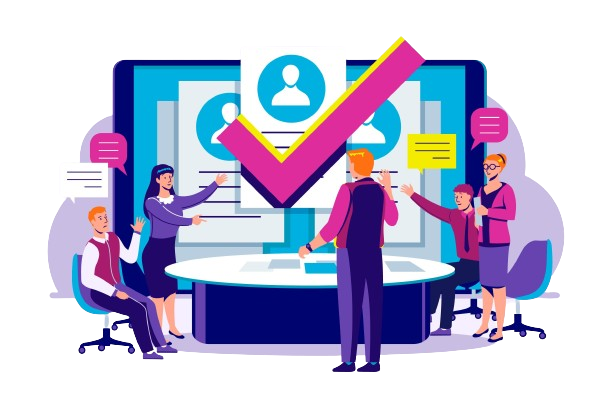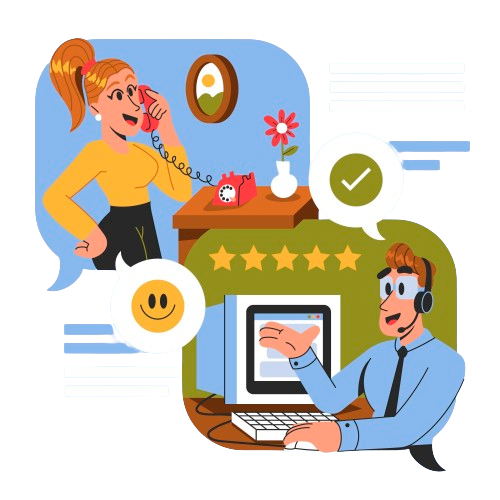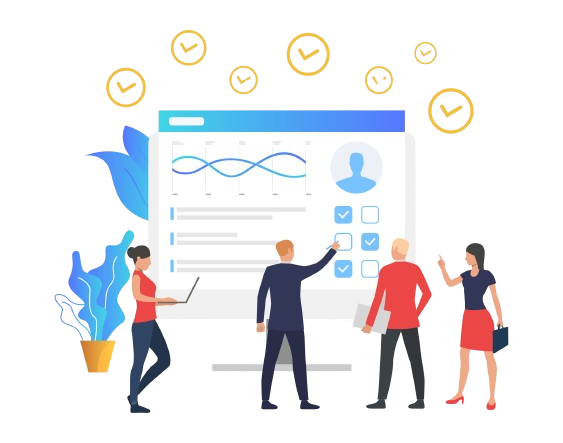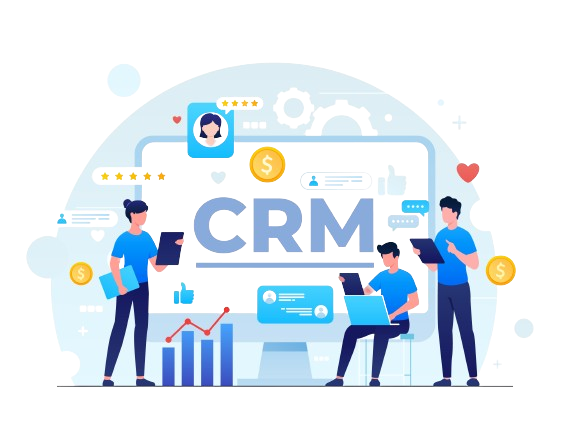
If you’re running a service business, you know how crucial it is to not just provide services but to make sure your customers are happy and satisfied. Ever wondered if your services are reaching the right people? And even if they are, are your customers delighted with how you and your team handle things? Let’s take a moment to reflect. Is your service business sailing smoothly, hitting those targets, and leaving your customers with smiles? If so, great job! But what if it’s not? Don’t worry; you’re not alone, and there’s a solution, i.e. CRM software.
In this blog, we’re diving into the world of CRM management software, the superhero that can rescue your service business from rough waters.
Imagine having a system that streamlines everything – from managing workflows to handling social communication, from efficient email marketing to seamlessly organizing bookings and appointments. That’s the power of CRM software in action. We’ll explore how you can gauge the success of your business and discover how CRM solutions can uplift your service business to new heights, making both your customers and your operations happier than ever. If things aren’t going as planned, fear not—CRM software might just be the game-changer you need. Let’s get started!
Evaluating Service Success: Are Your Offerings Reaching the Right Audience?

The first crucial step to ensuring success is evaluating whether your offerings are effectively reaching the right audience. After all, providing exceptional services begins with understanding and meeting the needs of your target customers. Here are some steps to find out that:
- Understanding Your Audience: Begin by identifying your target demographic. Who are your ideal customers? What are their preferences, pain points, and expectations? By creating detailed buyer personas, you gain valuable insights into the characteristics and behaviors of the audience you want to reach.
- Analyzing Reach and Engagement: Once your services are out in the market, it’s vital to analyze their reach and engagement. Are you attracting the audience you intended to? Tools like CRM software provide analytics that help track customer interactions, website visits, and social media engagement. This data allows you to measure the effectiveness of your outreach strategies.
- Customer Feedback and Reviews: Customer feedback is a goldmine of information. Pay attention to reviews, comments, and direct feedback from your clients. Are they expressing satisfaction, or are there areas that need improvement? By actively listening to your customers, you can refine your services to better align with their expectations.
- Utilizing CRM for Targeted Marketing: CRM software comes into play as a powerful ally in reaching the right audience. It enables targeted marketing by organizing customer data, allowing you to tailor your messages and promotions based on specific customer preferences. By utilizing CRM insights, you can design marketing campaigns that resonate with your audience, increasing the likelihood of capturing their attention.
- Course Correction Strategies: If the evaluation reveals gaps in reaching your target audience, it’s time for strategic course correction. Adjust your marketing strategies, refine your messaging, and leverage CRM data to inform decision-making. The goal is not just to deliver services but to ensure that they are reaching those who truly benefit from them.
By continually assessing and adapting, supported by the insights provided by tools, you can refine your approach, ensuring that your offerings effectively resonate with and meet the needs of your intended audience.
Customer Satisfaction Check: Ensuring Happy and Content Clients with CRM Software

The heartbeat of success lies in the satisfaction of your clients. You may be offering top-notch services, but the true measure of triumph is the smile on your customers’ faces and the contentment in their experiences.
To ensure that your clients are genuinely happy with your services, it’s crucial to regularly assess their level of satisfaction. Ask yourself: Are your customers pleased with the quality of your services? Are their needs and expectations being met, or perhaps exceeded? A customer satisfaction check involves delving into the perceptions and experiences of your clientele.
Key Indicators of Customer Satisfaction
- Feedback Loops: Establishing effective feedback channels, such as surveys or direct communication, allows you to gather valuable insights. Are there specific aspects that customers appreciate, or areas that need improvement? Constructive feedback serves as a compass for refining your services.
- Repeat Business: A loyal customer base is a strong indicator of satisfaction. If clients are returning for more, it signifies not only the quality of your services but also the positive experiences they associate with your business.
- Referrals and Recommendations: Happy clients become your best advocates. Pay attention to whether your satisfied customers are recommending your services to others. This organic form of promotion indicates trust and contentment.
The Role of CRM Tools in Ensuring Customer Satisfaction
Software tools have emerged as a valuable ally. These tools are equipped with features to track and analyze customer interactions, providing valuable data on preferences, feedback, and past engagements. By harnessing this information, you can tailor your services to meet the unique needs of each client.
Moreover, different tools allow you to create personalized communication strategies. Sending targeted messages, exclusive offers, and timely follow-ups show clients that their satisfaction is a priority. It’s about building not just a customer base but a community of delighted patrons.
With the right software as your guide, you can navigate this path more effectively, fostering an environment where happy and content clients become the driving force behind your success.
Navigating Challenges: What to Do When Business Targets Seem Out of Reach

In the journey of running a service business, encountering challenges is inevitable. There are moments when your business may hit a rough patch, and achieving your desired targets feels like a daunting task. It’s during these times that a reliable solution becomes crucial. So, what do you do when your business targets seem out of reach?
- Assess the Situation: The first step is to take a step back and assess the situation. Identify the specific challenges that are hindering your business’s success. Whether it’s a dip in customer engagement, operational inefficiencies, or a struggle to meet financial goals, understanding the root cause is essential.
- Customer Feedback and Satisfaction: One of the key aspects to explore is customer feedback. Are your clients truly satisfied with your services? Utilize surveys, reviews, and direct communication to gather insights. If there’s dissatisfaction, find out the solutions that can be instrumental in not only identifying these issues but also in devising strategies to address them promptly.
- Data-Driven Decision Making: Software like CRM empowers service businesses by providing valuable insights through data analytics. Utilize these insights to make informed decisions. Identify patterns, understand customer preferences, and refine your services accordingly. This data-driven approach can be a game-changer in steering your business towards success.
- Realignment of Strategies: If your business targets seem elusive, it might be time to reassess and realign your strategies. A CRM software assists in redefining marketing approaches, customer engagement tactics, and overall business strategies. By leveraging the features of CRM, you can adapt your plans based on real-time data and market trends.
- Proactive Issue Resolution: CRM doesn’t just identify problems; it’s a proactive tool for issue resolution. By addressing customer concerns swiftly and efficiently, you can turn challenges into opportunities for improvement. A satisfied customer is not only likely to stay with your service but can also become a loyal advocate for your business.
- Streamlining Operations: Often, challenges arise from internal operational inefficiencies. The right tool is not just about managing customers; it’s about streamlining every aspect of your business operations. From workflow management to resource allocation, software ensures that your business functions like a well-oiled machine.
Find out the right ally that can help you identify stumbling blocks and pave the way for a more efficient and successful business journey.
CRM Software: The Business Savior for Service Industries
Staying ahead means more than just providing exceptional services – it involves understanding your customers, managing relationships effectively, and optimizing your operational workflows. This is where CRM software for free emerges as the unsung hero, offering a plethora of benefits that can truly transform the way service businesses operate.
- Centralized Customer Data:
CRM software serves as a centralized hub for all customer-related information. Instead of scattered data across various platforms, a comprehensive CRM system consolidates customer details, interactions, and transaction histories in one accessible place. This means no more digging through emails or spreadsheets to understand your clients – everything you need is at your fingertips.
- Enhanced Customer Interaction:
Engaging with customers is key to any service-oriented business. CRM software provides a unified platform for efficient communication. Whether it’s responding to inquiries, handling support requests, or sending personalized messages, CRM ensures that interactions are timely, meaningful, and, most importantly, tailored to individual customer needs.
- Targeted Marketing and Sales:
Understanding your customer base allows for more effective marketing strategies. CRM software enables businesses to analyze customer preferences, track buying behavior, and create targeted marketing campaigns. By tailoring your approach based on customer insights, you increase the likelihood of converting leads into loyal clients.
- Operational Efficiency:
Service businesses often involve complex workflows, from managing appointments to handling service requests. CRM software streamlines these operational processes, eliminating redundancies and reducing the risk of errors. This efficiency not only saves time but also enhances the overall quality of service delivery.
- Real-Time Analytics:
One of the standout features of CRM software is its ability to provide real-time analytics. Service businesses can track their performance metrics, monitor customer satisfaction levels, and assess the effectiveness of various strategies. These insights empower businesses to make data-driven decisions and adapt to changing market dynamics swiftly.
- Scalability and Adaptability:
As service businesses grow, so do their needs. CRM software is designed to scale alongside your business, ensuring that it remains a valuable asset as your operations expand. Whether you’re a small startup or an established enterprise, CRM adapts to your requirements, providing a flexible solution that evolves with your business.
As we explore the multifaceted benefits of CRM, it becomes clear that this technology is not just a tool; it’s a strategic partner that propels service businesses toward sustained success.
Beyond Customer Management: Streamlining Company Operations with CRM

The role of CRM software extends far beyond its traditional function of managing customer interactions. Modern CRM systems are powerful tools that can revolutionize the overall operations of a company, providing a seamless and integrated approach to various facets of business.
- Booking Management: Efficiently managing bookings is a breeze with CRM software. From scheduling appointments to tracking reservations, CRM streamlines the booking process, minimizing scheduling conflicts and ensuring a smooth customer experience. This feature is especially crucial for businesses that operate on appointments, consultations, or reservations.
- Project Management: For service businesses handling projects, CRM software provides a centralized platform to manage tasks, timelines, and collaborations. Project management modules within CRM systems help in organizing workflows, assigning responsibilities, and keeping everyone on the same page, ultimately enhancing productivity and project success.
- Discount and Taxes: Navigating the intricacies of discounts and taxes becomes hassle-free with CRM software. Businesses can set up customized discount structures, apply taxes accurately, and automate calculations. This ensures transparency in billing processes and helps maintain compliance with tax regulations.
- Smart Analytics: CRM software doesn’t just manage data; it transforms it into actionable insights. Smart analytics tools embedded in CRM systems enable businesses to track performance metrics, customer behavior, and revenue trends. This data-driven approach empowers informed decision-making and strategic planning for sustainable growth.
- Add Services and Products: Adapting to changing customer demands is simplified with the ability to easily add new services and products within CRM systems. This flexibility ensures that your service offerings stay relevant and can be swiftly updated to meet evolving market trends.
- Get Paid Online: Modernize your payment processes by incorporating online payment capabilities through CRM software. Accept payments securely and conveniently, providing your customers with a seamless and convenient way to settle invoices. This feature not only enhances customer satisfaction but also accelerates cash flow.
- Billing Automation: Say goodbye to manual and time-consuming billing processes. CRM software automates billing workflows, generates invoices, and sends reminders automatically. This not only saves time but also minimizes errors, ensuring that your customers receive accurate and timely bills.
Thus, the transformative impact of CRM software goes well beyond customer management. It is a comprehensive solution that streamlines company operations, fosters collaboration, and empowers businesses to adapt, grow, and provide exceptional services.
Future-Proofing Your Service Business: The Transformative Impact of CRM Software

Staying ahead of the curve is not just a choice—it’s a necessity. This is where the transformative impact of CRM software comes into play, offering a future-proofing strategy that can redefine the way you operate and thrive.
Future-proofing is like creating a shield for your business against the uncertainties and changes that lie ahead. It involves adopting tools and strategies that not only address current challenges but also anticipate and adapt to the evolving landscape. CRM software stands out as a beacon in this journey, providing a comprehensive solution that goes beyond mere customer management.
- Adapting to Changing Customer Needs
As customer preferences and expectations shift, your service business needs to evolve in tandem. CRM software acts as a dynamic ally, allowing you to adapt to changing customer needs by providing valuable insights into their behaviors and preferences. By understanding your customers better, you can tailor your services to meet their expectations, ensuring long-term satisfaction and loyalty.
- Efficiency in Operations
One of the key aspects of future-proofing is streamlining operations to enhance efficiency. CRM software is not just about managing customer relationships; it’s a powerhouse that optimizes your internal processes. From automating workflows to simplifying task management, CRM ensures that your team operates with maximum efficiency, leaving room for innovation and growth.
- Scaling with Ease
In the ever-expanding landscape of service businesses, scalability is a crucial factor. CRM software facilitates seamless scalability by providing a centralized platform to manage increasing volumes of customer data, communications, and transactions. This adaptability ensures that your business can grow without being hindered by operational constraints.
- Anticipating Trends and Market Shifts
CRM software is equipped with advanced analytics and reporting features that empower you to anticipate market trends and shifts. By harnessing data-driven insights, you can make informed decisions, stay ahead of industry trends, and position your service business as an innovator rather than a follower.
- Enhancing Customer Communication
Future-proofing your service business also involves building robust communication channels. CRM software excels in this area, offering tools for effective social communication, personalized email marketing, and efficient customer engagement. These features not only strengthen your current relationships but also pave the way for future growth.
The transformative impact of CRM features and benefits extends far beyond the present, offering a strategic approach to future-proofing your service business. By leveraging its capabilities to adapt, optimize, and innovate, you position your business for sustained success in the service industry.